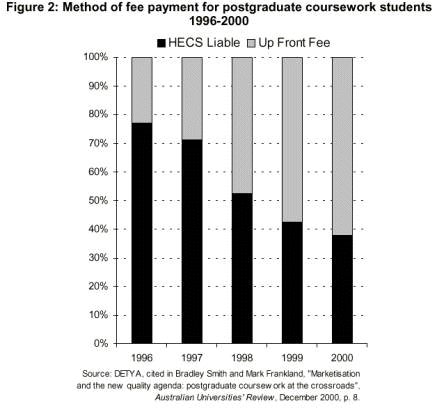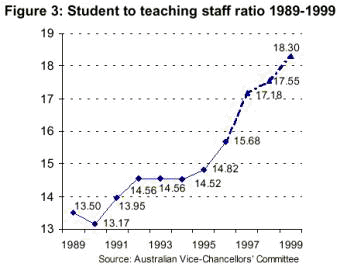To
introduce the matter:
"The
stripping of public resources from universities by the Howard Government, which
has driven this crisis [in university access and quality], is unprecedented in
the history of Commonwealth involvement in university funding. The damage that
was done to the accessibility and quality of Australia's universities in the
first years of the Howard Government was severe, however the full ramifications
of the changes to funding and fee structures have not yet been felt.
"At a time when there is growing global recognition of the need to invest in tertiary education, the Howard Government has chosen to abrogate its responsibility to provide for the social and economic security of Australia by bucking the international trend and cutting government investment in education.
"In
this context the policy reversal by the Prime Minister in the area of research
and development is insufficient to rectify the damage done during his tenure.
The scale of the package required to restore the viability of an accessible and
quality tertiary education sector far exceeds the commitments made in Backing
Australia's Ability. In contrast to the recent realisation of the need to
publicly invest in research and development, the Howard Government has put in
place policies which have directly reduced access and quality. Worse still, it
has chosen to do nothing to rectify the problems despite growing evidence of the
damage which it has done."
In this
framework it is worth reproducing the NTEU's figure 2 showing that the
progressive upfront charges imposed on postgraduates has increased from 23% at
the time the Howard Government was voted into office to 62% in 2000. These
students are the members of our society who teach the teachers and who are
expected to be the Nation's innovators.

In a recent Insight
program on SBS (March 8th) it was point out that the
student staff ratio at tertiary institutions had risen over 58% in the past 10
years. Figure 3 from the NTEU budget submission graphically illustrates the
enormity of this increase. It is noteworthy that the bulk of that decline in
staff to student ratio has occurred since the advent of the Howard Government. Labor
while by no means blameless, wasn't in the same league when it came to
demolition.

Regarding its recommendations for bolstering research the NTEU's principal
request is for an acceleration of the proposed increases to the Australian
Research Council's (ARC) competitive grants together with raising the total over
the coming five years to $864 million. By world standards that is still very
modest.

Of course the NTEU makes the point that it is of little use making more money
available for research grants if adequate facilities aren't available in which
to do the work. Again their proposal is extremely modest suggesting an increase
of 24% above that proposed by the Government, which - quite frankly - is pitiful
considering the deplorable state of the facilities at our 38 universities.

The next twelve months
hold promise of being one of Australia's most defining
periods. Should a Labor Government ascend to power, just how will Mr. Beazley's
still vague promises be crystallized? If the Australian Democrats hold the
balance of power in the Senate just how will their assurances that they believe
that science and education are a good thing worthy of support be demonstrated?
And if the Coalition be reelected, will they take any notice of the concerns of
our teachers and scientists? Come
to that do we Australians really care (really being code for proactively).
NTEU Budgetary Recommendations:
- RECOMMENDATION:
That
Government institute a single Higher Education Contribution Scheme rate set
at $2,644 (estimated cost: $843 million p/a).
- RECOMMENDATION:
That
Government returns the initial HECS repayment threshold to the level of
average male earnings, in three equal increases over the next three
financial years (estimated cost: nil).
- RECOMMENDATION:
That
Government create 10,000 HECS exempt scholarships, to be allocated to fields
of study deemed from time to time by government to areas of national
importance or high labour market demand (estimated cost: $26.6 million p/a).
- RECOMMENDATION: That Government make provision for improving and adding value to participation in higher education...